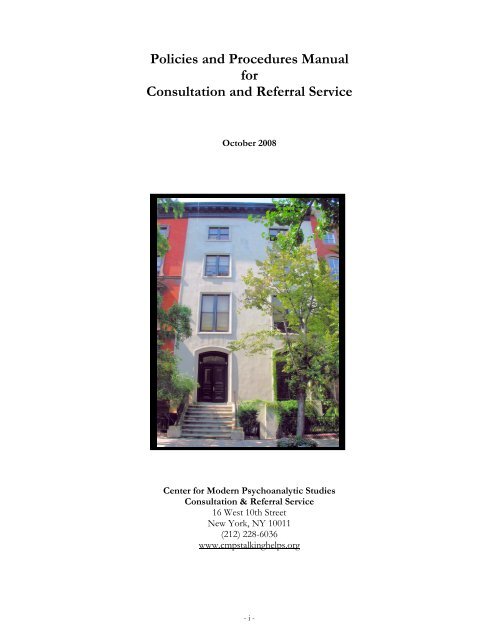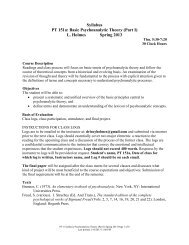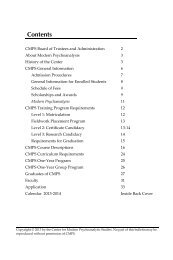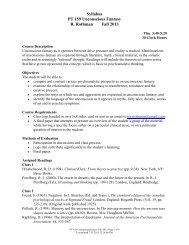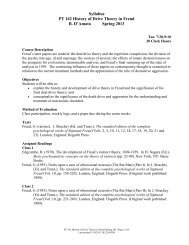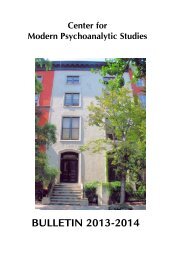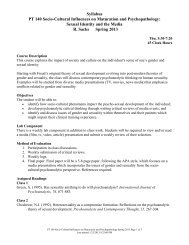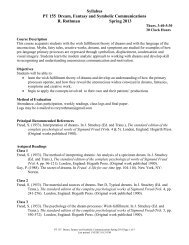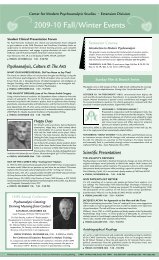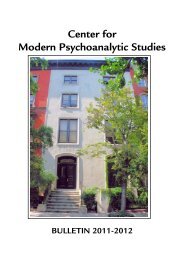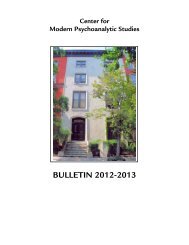Policies and Procedures Manual for Consultation and Referral Service
Policies and Procedures Manual for Consultation and Referral Service
Policies and Procedures Manual for Consultation and Referral Service
You also want an ePaper? Increase the reach of your titles
YUMPU automatically turns print PDFs into web optimized ePapers that Google loves.
<strong>Policies</strong> <strong>and</strong> <strong>Procedures</strong> <strong>Manual</strong><br />
<strong>for</strong><br />
<strong>Consultation</strong> <strong>and</strong> <strong>Referral</strong> <strong>Service</strong><br />
October 2008<br />
Center <strong>for</strong> Modern Psychoanalytic Studies<br />
<strong>Consultation</strong> & <strong>Referral</strong> <strong>Service</strong><br />
16 West 10th Street<br />
New York, NY 10011<br />
(212) 228-6036<br />
www.cmpstalkinghelps.org<br />
- i -
Directors<br />
Fellows<br />
ADMINISTRATION AND STAFF<br />
Ellen Barz, Clinical<br />
Angela Musolino, Administrative<br />
Hubertus Raben, Milena Cornick, Monday<br />
Charlotte Melnik, Ioanis Papavassiliu, Tuesday<br />
Angela Musolino, Marzieh Hadavi, Jennifer Wade, Wednesday<br />
Raúl García, Richard Sacks, Thursday<br />
Patrice LaMariana, Friday<br />
Adminstrative Assistant<br />
Externs<br />
Sarah Philipson<br />
Barbara Goldsmith, Robin Jones<br />
- ii -
TABLE OF CONTENTS<br />
Administration <strong>and</strong> Staff……………………………………………………….….. ii<br />
CERTIFICATE CANDIDACY AT THE REFERRAL SERVICE<br />
General In<strong>for</strong>mation………………………………………………………………. 1<br />
Administration…………………………………………………………………. 1<br />
Eligibility……………………………………………………………………….. 2<br />
Application……………………………………………………….…………….. 2<br />
Requirement of Good St<strong>and</strong>ing…………………………………..…………… 2-3<br />
Ethics………………………………………………………………………….. 3<br />
CLINICAL STUDIES INTERNSHIP 4<br />
Getting Started…………………………………………………………………….. 4<br />
<strong>Policies</strong> <strong>and</strong> <strong>Procedures</strong>……………………………………………..…………….. 4<br />
Patient Assignment…………………………………………………………….. 5<br />
Priority……………………………………………………………….…….. 5<br />
Registration……………………………………………………..………….. 5<br />
Intake Process………………………………………………………………….. 6<br />
Minors…………………………………………………………………..….. 6<br />
Daily schedules………………………………………………………..……….. 6<br />
Release of In<strong>for</strong>mation………………………………………………………… 7<br />
Interruption of Therapy……………………………………………………… 7<br />
Patient-initiated…………………………………………………………….. 7<br />
C<strong>and</strong>idate Absence or Withdrawal…………………………………………. 7<br />
Vacation…………………………………………………………………… 7<br />
Documentation of Clinical Process…………………………………………… 7<br />
Patient File Forms…………………………………………………………. 7-8<br />
Contact in<strong>for</strong>mation……………………………………………………….. 8<br />
Room Use…………………………………………………………………. 8<br />
<strong>Referral</strong> <strong>Service</strong> Facilities………………………………………………………. 9<br />
Telephone………………………………………………………………….. 9<br />
Stationery…………………………………………………………………… 9<br />
Room Condition……………………………………………………………. 9<br />
Clinical Supervision……………………………………………………………….. 9<br />
Registration…………………………………………………………………… 9-10<br />
Advancement to Level 3, Research C<strong>and</strong>idacy…………………………………..… 10<br />
Graduation………………………………………………………………………… 10<br />
Private Practice……………………………………………………………………. 11<br />
APPENDICES<br />
Application <strong>for</strong> Certificate C<strong>and</strong>idacy………...…… 12-13<br />
Request to begin PT 311………………………….. 14<br />
Request to begin PT 411………………………….. 15<br />
Intake Form………………………………………. 16<br />
First Assessment Interview. ………………….…… 17-18<br />
Assessment Interviews 2-5………………………… 19-20<br />
Patient Statistical In<strong>for</strong>mation……………….……. 21-22<br />
Authorization to Release In<strong>for</strong>mation…………..… 23<br />
Monthly Therapist Room Use Report………..…… 24<br />
Parental Consent Form…………………………… 25<br />
Termination Report………………………………. 26<br />
Summary of Experience in 311……………………. 27<br />
Summary of Experience in 411……………………. 28<br />
Release From <strong>Referral</strong> <strong>Service</strong> Responsibility……… 29<br />
Monthly Private Therapist Room Use Report…….. 30<br />
Application <strong>for</strong> Graduation……………………….. 31-40<br />
Release <strong>for</strong> Private Practice in the <strong>Referral</strong> <strong>Service</strong>… 41<br />
- iii -
CERTIFICATE CANDIDACY AT THE<br />
REFERRAL SERVICE<br />
GENERAL INFORMATION<br />
The <strong>Consultation</strong> <strong>and</strong> <strong>Referral</strong> <strong>Service</strong> of the Center <strong>for</strong> Modern<br />
Psychoanalytic Studies was established in 1972 as a non-profit, community-oriented<br />
service. Its purpose is two-fold: to provide advanced c<strong>and</strong>idates, as an integral part<br />
of their training in psychoanalytic practice <strong>and</strong> research, with clinical experience in<br />
conducting psychoanalytic therapy; <strong>and</strong> second, to offer af<strong>for</strong>dable, high-quality<br />
psychoanalytic services to the community.<br />
The <strong>Consultation</strong> <strong>and</strong> <strong>Referral</strong> <strong>Service</strong> of the Center <strong>for</strong> Modern<br />
Psychoanalysis (the <strong>Referral</strong> <strong>Service</strong>) is located in the lower Fifth Avenue area, at 16<br />
West 10 th Street, in an historic townhouse. The facility, renovated in 1998, consists<br />
of ten therapy rooms <strong>for</strong> individual, couple, <strong>and</strong> group sessions, a patient waiting<br />
area, <strong>and</strong> garden.<br />
The <strong>Referral</strong> <strong>Service</strong> is open Monday through Thursday 9 AM to 9 PM,<br />
Friday 9 AM to 8 PM <strong>and</strong> Saturday 9 AM to 1 PM.<br />
The <strong>Referral</strong> <strong>Service</strong> is closed on Sundays, New Year’s Day, Memorial Day,<br />
Independence Day, Labor Day, Thanksgiving Day, Christmas Day, <strong>and</strong> two weeks in<br />
the summer. The holiday <strong>and</strong> vacation schedule is posted at the beginning of each<br />
academic year.<br />
ADMINISTRATION<br />
Directors<br />
The Clinical Director is responsible <strong>for</strong> the overall clinical functioning of the<br />
members of the <strong>Referral</strong> <strong>Service</strong>; the Administrative Director is responsible <strong>for</strong> the<br />
overall administrative functioning. Both act as liaisons between the <strong>Referral</strong> <strong>Service</strong><br />
<strong>and</strong> the President of CMPS, <strong>and</strong> work collaboratively to implement Faculty Council<br />
policies <strong>and</strong> <strong>Referral</strong> <strong>Service</strong> procedures. Biweekly in<strong>for</strong>mational meetings are held<br />
between the Administrative Director of the <strong>Referral</strong> <strong>Service</strong> <strong>and</strong> the CMPS Director<br />
to discuss facility issues. Biweekly staff meetings of Fellows <strong>and</strong> Directors are held<br />
during the academic year to discuss <strong>and</strong> improve the training environment. These<br />
meetings provide the opportunity to discuss clinical <strong>and</strong> advisement issues,<br />
administrative matters, <strong>and</strong> outreach strategies. <strong>Policies</strong> <strong>and</strong> procedures are reviewed<br />
<strong>and</strong> changed to better serve clinical <strong>and</strong> educational development. C<strong>and</strong>idates<br />
enrolled in the program are invited to contribute to this process through meetings<br />
with their Fellows. Problematic clinical issues <strong>and</strong> questions about patients’<br />
suitability <strong>for</strong> therapy are resolved at these meetings. C<strong>and</strong>idates enrolled in the<br />
program are invited to contribute to this process through meetings with their<br />
Fellows.<br />
- 1 -
Fellows<br />
Each Fellow is present at the <strong>Referral</strong> <strong>Service</strong> <strong>for</strong> 4½ hours on a designated<br />
day to serve as the administrator in charge of the facility. All questions, problems <strong>and</strong><br />
incidents are brought to the Fellow’s attention. The Fellows also function as<br />
academic <strong>and</strong> clinical advisors responsible <strong>for</strong> the education <strong>and</strong> clinical<br />
development of their assigned c<strong>and</strong>idates. The Fellows assess their c<strong>and</strong>idates’<br />
readiness <strong>for</strong> intakes <strong>and</strong> monitor the intake of new patients, guiding c<strong>and</strong>idates in<br />
administrative requirements <strong>and</strong> documentation. In consultation with the Directors,<br />
the Fellows assist in assembling adequate in<strong>for</strong>mation to evaluate the suitability <strong>for</strong><br />
therapy of incoming new cases identified as problematic.<br />
Externs<br />
Externs are generally work-study students or graduate volunteers who are<br />
responsible to the Fellow in charge of the day <strong>and</strong> to the Directors of the <strong>Referral</strong><br />
<strong>Service</strong>. Their duties include the implementation of special projects, on-going desk<br />
coverage, record keeping, processing <strong>and</strong> storing in<strong>for</strong>mation.<br />
Administrative Assistant<br />
The Administrative Assistant oversees scheduling of patients, consulting<br />
room assignments, telephone contacts <strong>and</strong> messages, <strong>and</strong> record-keeping. Intakes are<br />
assigned according to the priority list compiled by the Fellows.<br />
ELIGIBILITY<br />
After a minimum of 100 hours of approved training analysis, successful<br />
completion of the Fieldwork Program, <strong>and</strong> the pre-requisite coursework, a<br />
matriculated CMPS student in good st<strong>and</strong>ing can apply <strong>for</strong> Level 2, Certificate<br />
C<strong>and</strong>idacy, <strong>and</strong> entry into the <strong>Referral</strong> <strong>Service</strong> internship.<br />
APPLICATION<br />
When eligible, the student initiates the application process by submitting the<br />
“Application <strong>for</strong> Certificate C<strong>and</strong>idacy” (pp. 12-13) to his or her academic advisor<br />
prior to the application deadline date posted each semester. If the advisor approves<br />
the application, the student is referred by the advisor to the Clinical Director of the<br />
<strong>Referral</strong> <strong>Service</strong> <strong>for</strong> an interview. Final approval to register at Level 2 is determined<br />
after the completion of this interview.<br />
REQUIREMENTS FOR GOOD STANDING<br />
During the certificate c<strong>and</strong>idacy period, c<strong>and</strong>idates must continue in an<br />
approved PT 7 individual weekly training analysis. Any disruption in the training<br />
analysis is to be reported to the Fellow within 24 hours. C<strong>and</strong>idates must meet all the<br />
academic requirements attendant to their level of training (see Bulletin), maintain <strong>and</strong><br />
- 2 -
document an individual liability insurance policy, submit all clinical <strong>and</strong><br />
administrative <strong>for</strong>ms when due, <strong>and</strong> meet case supervision requirements.<br />
ETHICS<br />
C<strong>and</strong>idates are expected to conduct themselves according to the guidelines<br />
of the Code of Conduct governing ethical behavior of c<strong>and</strong>idates in training.<br />
- 3 -
CLINICAL STUDIES INTERNSHIP<br />
GETTING STARTED<br />
Internship begins with an assignment to a fellow. The c<strong>and</strong>idate discusses<br />
this assignment during the application interview with the Clinical Director <strong>and</strong> is<br />
notified of the assignment by the Administrative Director prior to the beginning of<br />
the semester. During the first year of internship, the c<strong>and</strong>idate meets weekly with<br />
the fellow <strong>for</strong> 20 minutes. During these meetings the c<strong>and</strong>idate learns the<br />
administrative aspects of working at the <strong>Referral</strong> <strong>Service</strong>, including policies,<br />
procedures, <strong>and</strong> documentation requirements <strong>for</strong> patient <strong>and</strong> student files.<br />
Of special importance during this first year is attention to intake procedures<br />
<strong>and</strong> processes. When patients have been assigned <strong>and</strong> analysis begun, the c<strong>and</strong>idate<br />
presents these cases <strong>and</strong> discusses case management issues with the Fellow. In<br />
subsequent years, the c<strong>and</strong>idate <strong>and</strong> Fellow collaborate to determine the frequency<br />
of their meetings. Both the c<strong>and</strong>idate <strong>and</strong> the Fellow have the option at any time<br />
over the course of the semester to request additional meetings beyond the agreedupon<br />
schedule.<br />
The Fellow acts as the academic advisor <strong>for</strong> the c<strong>and</strong>idate <strong>and</strong> reviews<br />
registration <strong>for</strong>ms prior to the beginning of each semester, assessing academic<br />
progress <strong>and</strong> current learning needs. Application to begin PT 311 Individual<br />
Supervision of <strong>Referral</strong> <strong>Service</strong> Cases (p. 14) <strong>and</strong> PT 411 Control Analysis of a<br />
<strong>Referral</strong> <strong>Service</strong> Case (p. 15) are submitted to the Fellow <strong>for</strong> review <strong>and</strong> approval<br />
when the c<strong>and</strong>idate becomes eligible <strong>for</strong> these advanced supervisions. The c<strong>and</strong>idate<br />
is responsible <strong>for</strong> maintaining the required academic <strong>and</strong> clinical files. Periodically<br />
the Fellow <strong>and</strong> c<strong>and</strong>idate will review all files to insure that they are up-to-date.<br />
At the conclusion of each semester, the Fellow <strong>and</strong> c<strong>and</strong>idate evaluate the<br />
c<strong>and</strong>idate’s work at the <strong>Referral</strong> <strong>Service</strong>, noting any recommendations <strong>for</strong> training in<br />
the c<strong>and</strong>idate’s official academic record.<br />
POLICIES AND PROCEDURES<br />
PATIENT ASSIGNMENT<br />
C<strong>and</strong>idates in good st<strong>and</strong>ing are eligible to see three or more <strong>Referral</strong> <strong>Service</strong><br />
patients. The c<strong>and</strong>idate in<strong>for</strong>ms the Fellow of his or her hours of availability. The<br />
c<strong>and</strong>idate regularly checks to ensure that this in<strong>for</strong>mation is up-to-date, accurate, <strong>and</strong><br />
recorded on the appropriate <strong>for</strong>m in the intake book.<br />
C<strong>and</strong>idates are expected to maintain three individual analytic cases be<strong>for</strong>e<br />
being assigned couples, families, children, or groups. Exceptions are made with the<br />
approval of the Fellow Group.<br />
- 4 -
Priority<br />
Patients are referred to c<strong>and</strong>idates according to the priority level determined<br />
by the Fellow, <strong>and</strong> by the c<strong>and</strong>idate’s availability. When c<strong>and</strong>idates have<br />
demonstrated proficiency with intake procedures <strong>and</strong> patient management on their<br />
assigned day, they may request to have additional hours on other days. Requests <strong>for</strong><br />
scheduling changes are discussed <strong>and</strong> mutually agreed upon by a c<strong>and</strong>idate <strong>and</strong> his or<br />
her Fellow. Morning, early afternoon, <strong>and</strong> late evening hours are available to<br />
c<strong>and</strong>idates who want additional patients on other than their assigned day. Premium<br />
evening hours, i.e. between 4 PM <strong>and</strong> 7 PM, are reserved <strong>for</strong> students working on<br />
their assigned day. Requests to see patients during these hours by c<strong>and</strong>idates from<br />
other days are discussed with the c<strong>and</strong>idate’s Fellow <strong>and</strong> approved by the Fellow of<br />
the alternate day.<br />
Fellows determine priority <strong>for</strong> assignment of new intakes. Top priority is<br />
given to c<strong>and</strong>idates in the first semester of internship. Other factors considered are<br />
the number of cases a c<strong>and</strong>idate is carrying <strong>and</strong> length of time since last referral.<br />
Registration<br />
The prospective patient makes the initial phone contact or drop-in office<br />
visit. A Fellow or the Administrative Assistant records the following in<strong>for</strong>mation in<br />
the intake book: patient’s name, address, phone number, source of referral, <strong>and</strong><br />
patient’s availability by day <strong>and</strong> time. The Fellow or the Administrative Assistant,<br />
using the eligibility list, arranges an intake appointment <strong>for</strong> the patient with the next<br />
available c<strong>and</strong>idate who has hours coinciding with the patient’s. Ef<strong>for</strong>t is made to<br />
effect an intake appointment at the time of the first contact. Patient requests <strong>for</strong> a<br />
specific c<strong>and</strong>idate are honored whenever possible.<br />
During the initial contact, the patient is advised that there is a $40 fee to be<br />
paid at the time of registration. If the patient asks about the cost of sessions, he or<br />
she is advised that fees are arranged between the therapist <strong>and</strong> the patient. If other<br />
questions arise during the initial contact, the patient is encouraged to discuss them<br />
during the intake appointment.<br />
When the patient arrives <strong>for</strong> the intake appointment, he or she is asked to fill<br />
out the Intake Form (p. 16) at the reception area <strong>and</strong> the intake fee is collected. The<br />
patient is then directed to the waiting area. C<strong>and</strong>idates who are expecting an intake<br />
should be available in the therapy area a few minutes prior to the scheduled time.<br />
The c<strong>and</strong>idate collects <strong>and</strong> reviews the registration <strong>for</strong>m during the intake interview.<br />
INTAKE PROCESS<br />
The <strong>Referral</strong> <strong>Service</strong> allows c<strong>and</strong>idates one to five sessions <strong>for</strong> continuing<br />
intake. In most cases enough in<strong>for</strong>mation is gathered during the first interview to<br />
allow <strong>for</strong> a determination of the disposition of the case. These decisions are made after<br />
discussion with the fellow. If there is no further in<strong>for</strong>mation to be obtained, the patient<br />
<strong>and</strong> c<strong>and</strong>idate may agree to work together. If there is no agreement to work together,<br />
the c<strong>and</strong>idate discusses the reasons with the Fellow so that an appropriate<br />
- 5 -
eassignment can be made. Intake sessions should be extended beyond the initial<br />
visit when additional in<strong>for</strong>mation is needed or suitability <strong>for</strong> therapy requires further<br />
clarification. Establishing frequency <strong>and</strong> fee mark the end of the intake process.<br />
Issues may arise during the intake interview or during the course of ongoing<br />
analysis that need to be brought to the immediate attention of the Fellow. The<br />
following problems should be brought to the immediate attention of the Fellow:<br />
1) Potential suicidal or homicidal risks;<br />
2) Life-threatening illness;<br />
3) Pending legal action or court m<strong>and</strong>ated therapy;<br />
4) Child abuse <strong>and</strong> neglect issues;<br />
5) Recent psychiatric hospitalization <strong>and</strong> psychiatric history;<br />
6) An intuition that something is wrong in a case even if the problem cannot be<br />
immediately defined.<br />
The Fellow determines what further investigation or action is necessary.<br />
When necessary, the Clinical Director of the <strong>Referral</strong> <strong>Service</strong>, the Fellow, the<br />
Supervisor, <strong>and</strong> the c<strong>and</strong>idate work together to assess the patient’s suitability <strong>for</strong><br />
therapy. In the event that a psychiatric consultation is indicated, the patient is so<br />
advised. The <strong>Referral</strong> <strong>Service</strong> does not make referrals to specific psychiatric<br />
specialists but will communicate with the patient’s selected psychiatric specialist as<br />
needed <strong>and</strong> when the patient fills out an Authorization to Release Patient<br />
In<strong>for</strong>mation <strong>for</strong>m (p. 23 ).<br />
Minors<br />
Prospective patients under the age of eighteen may be seen at the <strong>Referral</strong><br />
<strong>Service</strong> only with the written consent of the parent or guardian on the Consent Form<br />
<strong>for</strong> Treating a Child or Minor (p. 25).<br />
DAILY SCHEDULES<br />
Administrative issues such as changes in time, room, or day are discussed <strong>and</strong><br />
made with the Fellow. Only Fellows <strong>and</strong> the Administrative Assistant make entries<br />
or changes in the daily schedule book. The c<strong>and</strong>idate consults with the Clinical<br />
Supervisor regarding the resistive aspects of a patient’s request <strong>for</strong> schedule changes.<br />
RELEASE OF INFORMATION<br />
Be<strong>for</strong>e responding in writing or by phone to requests <strong>for</strong> any in<strong>for</strong>mation<br />
about a patient, the c<strong>and</strong>idate discusses the matter with the Fellow <strong>and</strong> the<br />
Supervisor. The patient signs the Authorization to Release In<strong>for</strong>mation Form (p.<br />
23). If in<strong>for</strong>mation is given, one copy of the signed <strong>for</strong>m is placed in the patient’s<br />
<strong>Referral</strong> <strong>Service</strong> file, <strong>and</strong> one is sent to the person requesting in<strong>for</strong>mation.<br />
- 6 -
INTERRUPTION OF THERAPY<br />
Patient-Initiated<br />
Breaks in therapy are reported verbally to the Fellow within 24 hours of the<br />
last session <strong>and</strong> are discussed with the Clinical Supervisor. The Fellow contacts the<br />
patient within 48 hours <strong>for</strong> administrative follow up if that is necessary. The<br />
c<strong>and</strong>idate fills out a Termination Report (p. 26) when no future appointments have<br />
been agreed to, even if there is an expectation that the person may return to the<br />
<strong>Referral</strong> <strong>Service</strong> at some future date.<br />
C<strong>and</strong>idate Absence or Withdrawal<br />
When a c<strong>and</strong>idate is unavailable <strong>for</strong> sessions, the fellow is given notice. If a<br />
short-term leave of absence is necessary, the c<strong>and</strong>idate <strong>and</strong> the fellow work out a<br />
plan <strong>for</strong> the patients.<br />
C<strong>and</strong>idates who are planning to withdraw from the <strong>Referral</strong> <strong>Service</strong> discuss<br />
the situation with the Fellow immediately <strong>and</strong> return their patients to the <strong>Referral</strong><br />
<strong>Service</strong> <strong>for</strong> transfer to another therapist. The process of in<strong>for</strong>ming the patients of the<br />
c<strong>and</strong>idate’s planned leave begins only after a plan has been <strong>for</strong>mulated with the<br />
Fellow, the Clinical Supervisor, <strong>and</strong> the c<strong>and</strong>idate. Reassignment is determined by<br />
the Fellow. If patients do not choose to continue therapy at the <strong>Referral</strong> <strong>Service</strong>,<br />
they are asked to sign a Release from Responsibility <strong>for</strong>m (p. 29) <strong>and</strong> to meet with a<br />
Fellow <strong>for</strong> an exit interview.<br />
Vacation<br />
C<strong>and</strong>idates are encouraged to plan their vacations during the month of<br />
August, but whenever the therapist decides to take a vacation, the Fellow is in<strong>for</strong>med<br />
in advance.<br />
DOCUMENTATION OF CLINICAL PROCESS<br />
Patient File Forms<br />
In addition to the Intake <strong>for</strong>m (p. 16) that the patient fills out during the<br />
first visit, the c<strong>and</strong>idate completes the Intake In<strong>for</strong>mation Form <strong>and</strong> First<br />
Assessment Interview <strong>for</strong>m (p. 17-18), the Ongoing Assessment <strong>for</strong>m (p. 19-20),<br />
which documents the second to fifth visits, <strong>and</strong> the Statistical Data <strong>for</strong>m (p. 21-22).<br />
The Statistical Data <strong>for</strong>m can be completed over time as the in<strong>for</strong>mation emerges in<br />
the clinical process. All these <strong>for</strong>ms are completed <strong>and</strong> placed in the patient’s<br />
individual chart <strong>and</strong> filed in the active file cabinet at the end of the fifth<br />
appointment. Ongoing documentation is as follows:<br />
PT 211: Process notes <strong>for</strong> six sessions <strong>and</strong> a summary <strong>for</strong> each patient<br />
covered in the supervision is submitted at the end of the semester to the Fellow.<br />
Process notes are typed on 8 ½” x 11” st<strong>and</strong>ard white paper. The heading includes<br />
the patient’s first name only or case number, name of c<strong>and</strong>idate, name of supervisor,<br />
- 7 -
semester, <strong>and</strong> date of session. These notes are then placed in the patient’s file.<br />
PT 311: A case summary of each patient is submitted to the Fellow at the<br />
end of each semester. The patient’s summary is typed on 8 ½” x 11” st<strong>and</strong>ard white<br />
paper, a separate sheet <strong>for</strong> each patient. The heading includes the patient’s first name<br />
only <strong>and</strong> case number, name of c<strong>and</strong>idate, name of supervisor, <strong>and</strong> the semester.<br />
PT 411: A case summary of each patient is submitted to the Fellow at the<br />
end of each semester. The patient’s summary is typed on 8 ½” x 11” st<strong>and</strong>ard white<br />
paper, a separate sheet <strong>for</strong> each patient. The heading includes the patient’s first name<br />
only <strong>and</strong> case number, name of c<strong>and</strong>idate, name of supervisor, <strong>and</strong> the semester.<br />
Contact In<strong>for</strong>mation<br />
Each c<strong>and</strong>idate at the <strong>Referral</strong> <strong>Service</strong> fills out a Rolodex card. This card is<br />
kept in the Fellows office to facilitate access to c<strong>and</strong>idate <strong>and</strong> patient in<strong>for</strong>mation.<br />
The Rolodex card includes:<br />
(a) C<strong>and</strong>idate’s name, address, home, <strong>and</strong> work telephone numbers. It is<br />
important that c<strong>and</strong>idates designate which phone numbers are private <strong>and</strong> which<br />
may be given to patients.<br />
(b) Names, addresses, telephone numbers, <strong>and</strong> case numbers of all <strong>Referral</strong><br />
<strong>Service</strong> patients with their starting <strong>and</strong> terminating dates. C<strong>and</strong>idates are responsible<br />
<strong>for</strong> entering all in<strong>for</strong>mation in the file as new referrals are received <strong>and</strong> as cases<br />
terminate.<br />
Room Use<br />
The laboratory course fee covers room rental <strong>for</strong> three referred patient hours<br />
per week. A room rental fee of $10.00 per hour is charged to therapists with more<br />
than three patient hours per week. The room is rented by the month; the c<strong>and</strong>idate is<br />
responsible <strong>for</strong> payment whether or not the room is used. The Monthly Therapist<br />
Room Use Report (p. 24) is completed <strong>and</strong> signed by the c<strong>and</strong>idate after the last<br />
session of the month is conducted. The <strong>for</strong>ms are submitted to the Fellow. These<br />
<strong>for</strong>ms also document the number of contact hours, both direct <strong>and</strong> indirect, that the<br />
c<strong>and</strong>idate has accrued <strong>and</strong> becomes part of the c<strong>and</strong>idate’s education <strong>and</strong> experience<br />
requirement <strong>for</strong> subsequent licensing.<br />
<strong>Referral</strong> service c<strong>and</strong>idates who possess a valid New York State license to<br />
conduct psychotherapy may see private cases at the <strong>Referral</strong> <strong>Service</strong> during available<br />
hours <strong>for</strong> a room rental fee of $15.00 per hour. Rental fees <strong>for</strong> groups are $20.00 <strong>for</strong><br />
a 90-minute session. Arrangements to see private practice patients are discussed with<br />
the c<strong>and</strong>idate’s Fellow <strong>and</strong> the Administrative Director. Room fees <strong>for</strong> private cases<br />
are paid at the beginning of the month. A Monthly Private Therapist Room Use<br />
Form (p. 30) should be completed <strong>and</strong> signed by the therapist <strong>and</strong> is given to the<br />
CMPS Director with the appropriate payment.<br />
- 8 -
REFERRAL SERVICE FACILITIES<br />
Telephone<br />
The office telephone may be used to call patients who are late <strong>for</strong> an<br />
appointment. When clinically appropriate, c<strong>and</strong>idates provide their own phone<br />
numbers to their patients so that the c<strong>and</strong>idates can be reached directly. C<strong>and</strong>idates’<br />
phone numbers are never given to patients be<strong>for</strong>e the intake process is completed.<br />
Since the efficacy of telephone sessions is still in the experimental phase <strong>and</strong><br />
<strong>Referral</strong> <strong>Service</strong> c<strong>and</strong>idates are being trained to work in the physical presence of a<br />
patient who is lying on the couch, telephone sessions with <strong>Referral</strong> <strong>Service</strong> patients<br />
are not permitted.<br />
Stationery<br />
C<strong>and</strong>idates may use <strong>Referral</strong> <strong>Service</strong> stationery only after discussion with <strong>and</strong><br />
the agreement of their Fellow.<br />
Room Condition<br />
Consulting rooms are left in good condition after sessions, with furniture<br />
restored to original positions <strong>and</strong> used napkins thrown away. The last c<strong>and</strong>idate to<br />
use the room each day is responsible <strong>for</strong> turning off all lights, unplugging room<br />
heaters, <strong>and</strong> generally noting that the room is left in an orderly condition. Doors are<br />
left open when the room is not in use, <strong>and</strong> the Therapist Not in Session sign is<br />
posted on the door. C<strong>and</strong>idates report any problem in room condition or other<br />
therapy area to the Fellow on duty. If a Fellow is not available, a note is left in the<br />
Fellow’s mailbox. If the problem requires urgent attention, CMPS office staff are<br />
notified.<br />
CLINICAL SUPERVISION<br />
REQUIREMENTS<br />
Faculty supervisors guide the training of the c<strong>and</strong>idates. Every <strong>Referral</strong><br />
<strong>Service</strong> case must have an approved supervisor who is responsible <strong>for</strong> the clinical<br />
management of the case.<br />
PT 211 Each section covers a maximum of three cases.<br />
PT 311 C<strong>and</strong>idates who wish to begin PT 311 supervision submit a written<br />
application (p. 14) to their Fellow. Generally, one session of supervision covers four<br />
patient hours.<br />
PT 411. C<strong>and</strong>idates who wish to begin a PT 411 supervision submit a written<br />
application to their Fellow (p. 15). It is recommended that c<strong>and</strong>idates have worked<br />
with at least one <strong>Referral</strong> <strong>Service</strong> case <strong>for</strong> a period of one year prior to beginning PT<br />
- 9 -
411 with an approved Control Analyst. PT 411 may be carried concurrently with or<br />
following one year of PT 311.<br />
C<strong>and</strong>idates engaged in research <strong>for</strong> a final project are expected to continue in<br />
PT 411 until the completion of the project. In general, the ratio of one session of<br />
supervision to four patient sessions satisfies the requirement. Any exception to this<br />
frequency must be approved by the c<strong>and</strong>idate’s Fellow in order <strong>for</strong> the hours to<br />
receive credit.<br />
DOCUMENTATION<br />
PT 311. At the end of each semester of internship, c<strong>and</strong>idates summarize the<br />
supervisory experience <strong>and</strong> its relationship to their clinical work. The evaluation<br />
<strong>for</strong>m (p. 27) is submitted to the supervisor <strong>for</strong> approval <strong>and</strong> signature <strong>and</strong> then to<br />
the Fellow by the end of the semester.<br />
PT 411. A summary (p. 28) is submitted to the Control Analyst <strong>for</strong> approval<br />
<strong>and</strong> signature <strong>and</strong> then to the Fellow by the end of the semester.<br />
ADVANCEMENT TO LEVEL 3, RESEARCH<br />
CANDIDACY<br />
Advancement to Research C<strong>and</strong>idacy is based on an assessment of the<br />
c<strong>and</strong>idate’s clinical <strong>and</strong> academic work. The minimum requirements include<br />
successful completion of required coursework (see bulletin), 25 hours of PT 411<br />
Control Analysis, sufficient experience analyzing three patients to demonstrate<br />
underst<strong>and</strong>ing of resistance, transference <strong>and</strong> countertransference, <strong>and</strong> the<br />
recommendation of the c<strong>and</strong>idate’s Fellow to schedule a clinical presentation. The<br />
purpose of this presentation is to further assess the c<strong>and</strong>idate’s clinical skills to<br />
identify areas of clinical practice that the c<strong>and</strong>idate <strong>and</strong> faculty determine are<br />
essential to ready the c<strong>and</strong>idate <strong>for</strong> graduation <strong>and</strong> independent practice. Three<br />
patients are presented in the allotted 45 minutes.<br />
After the clinical presentation, the c<strong>and</strong>idate discusses the recommendations<br />
of the faculty with the Fellow. The c<strong>and</strong>idate is then eligible to register <strong>for</strong> the<br />
research <strong>and</strong> advanced clinical courses listed in the bulletin as reserved <strong>for</strong> Research<br />
C<strong>and</strong>idates.<br />
GRADUATION<br />
When the c<strong>and</strong>idate’s research paper has been officially approved by all of<br />
the committee members, the c<strong>and</strong>idate prepares <strong>and</strong> submits an application <strong>for</strong><br />
graduation (pp. 31-40) to his or her Fellow <strong>for</strong> review. The Fellow signs the<br />
application <strong>and</strong> <strong>for</strong>wards it to the Director of Advisement <strong>for</strong> final review. The<br />
Director of Advisement arranges an interview with the c<strong>and</strong>idate, approves the<br />
application, <strong>and</strong> schedules an oral presentation by the c<strong>and</strong>idate be<strong>for</strong>e the Faculty.<br />
- 10 -
Successful presentation be<strong>for</strong>e the Faculty marks the official graduation date of the<br />
c<strong>and</strong>idate.<br />
RELEASE OF PATIENTS FROM THE REFERRAL SERVICE<br />
Prior to graduation, the c<strong>and</strong>idate <strong>and</strong> the Fellow will discuss procedures <strong>for</strong><br />
leaving the <strong>Referral</strong> <strong>Service</strong>, specifically referring those patients who wish to remain<br />
<strong>Referral</strong> <strong>Service</strong> patients to other c<strong>and</strong>idates in training <strong>and</strong> preparing those patients<br />
who wish to enter the private practice of the graduating c<strong>and</strong>idate. New York State<br />
law requires that all persons conducting psychoanalysis or psychotherapy in New<br />
York State must possess a valid license. In order <strong>for</strong> patients to be released from the<br />
<strong>Referral</strong> <strong>Service</strong> to a graduate <strong>for</strong> private practice, documentation of a license or a<br />
limited permit is required. Be<strong>for</strong>e the <strong>Referral</strong> <strong>Service</strong> can release a patient into a<br />
c<strong>and</strong>idate’s private practice, the patient must sign a release <strong>for</strong>m (p. 29), which is<br />
then given to the Fellow by the c<strong>and</strong>idate. Once the Fellow signs the release <strong>for</strong>m,<br />
the patient can be moved to private practice. If the graduate wants to continue to see<br />
patients in private practice on the premises under the procedures governing<br />
graduates, the patient must sign a release <strong>for</strong>m (p. 41) <strong>and</strong> follow the procedures<br />
listed in the following section of the manual.<br />
PRIVATE PRACTICE FOR GRADUATES AND<br />
OTHER PROFESSIONALS<br />
Private practice cases may be seen at the <strong>Referral</strong> <strong>Service</strong> facility during nonprime<br />
time hours. Prime time hours between 4 PM <strong>and</strong> 8 PM are reserved <strong>for</strong><br />
students at the <strong>Referral</strong> <strong>Service</strong> <strong>and</strong> are there<strong>for</strong>e not available <strong>for</strong> private practice<br />
rental. Practitioners wishing to secure space <strong>for</strong> private practice must contact the<br />
Administrative Director of the <strong>Referral</strong> <strong>Service</strong> who will determine if space is<br />
available. If space is available, the Administrative Director will approve the usage <strong>and</strong><br />
notify the fellow of the day <strong>and</strong> the CMPS Director. Private practice therapists must<br />
be licensed in the State of New York to deliver psychotherapy or psychoanalysis <strong>and</strong><br />
must provide a copy of their license, current registration, <strong>and</strong> proof of malpractice<br />
coverage prior to using <strong>Referral</strong> <strong>Service</strong> space. Reservations are made on a monthly<br />
basis <strong>and</strong> therapists are responsible <strong>for</strong> payment on a monthly basis. The rental<br />
agreement is limited to the specified room <strong>and</strong> time contracted by the month. The<br />
fee is $60.00 per month <strong>for</strong> a 4-week month, $75 <strong>for</strong> a 5-week month. Fees are<br />
payable by check at the beginning of each month. A Monthly Private Therapist<br />
Room Use Report (p. 30) signed by the therapist accompanies the check <strong>and</strong> is given<br />
to the CMPS Director. Rooms are available on the hour or half-hour. Rooms are to<br />
be vacated five minutes be<strong>for</strong>e the next appointment <strong>and</strong> left in good condition.<br />
- 11 -
- 12 -
- 13 -
- 14 -
- 15 -
- 16 -
- 17 -
- 18 -
- 19 -
- 20 -
- 21 -
- 22 -
- 23 -
- 24 -
- 25 -
- 26 -
- 27 -
- 28 -
- 29 -
- 30 -
- 31 -
- 32 -
- 33 -
- 34 -
- 35 -
- 36 -
- 37 -
- 38 -
- 39 -
- 40 -
- 41 -


